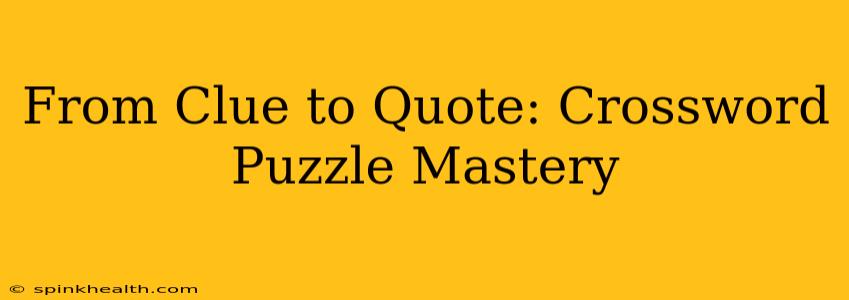Crossword puzzles: the quintessential brain teaser, a relaxing pastime, and a surprisingly challenging intellectual exercise. Whether you're a seasoned solver or a curious newcomer, mastering the art of cracking those cryptic clues requires a blend of strategy, vocabulary, and a dash of lateral thinking. This guide delves into the techniques and tips that will transform you from a casual solver to a crossword champion.
What are the different types of crossword clues?
Crossword clues come in various forms, each requiring a slightly different approach. Understanding these variations is crucial for puzzle success. The most common types include:
- Direct Clues: These clues directly define the answer. For example, "A large feline" (LION). These are often the easiest to solve.
- Indirect Clues: These clues use synonyms, metaphors, or wordplay to hint at the answer. For example, "King of the jungle" (LION). This requires a deeper understanding of language.
- Cryptic Clues: These clues are the most challenging, incorporating wordplay, puns, anagrams, and other techniques to obscure the answer. They often involve multiple layers of meaning. For example, "Lion's share (5)" might refer to the answer "MAJOR," using a well-known phrase.
- Anagram Clues: These clues indicate that the letters of the answer can be rearranged to form another word or phrase. Often signaled by words like "mixed," "jumbled," or "scrambled."
- Hidden Word Clues: These clues contain the answer hidden within the clue itself.
Mastering each type requires practice and careful attention to detail. Don't be afraid to try different approaches if one method isn't yielding results.
How can I improve my vocabulary for crossword puzzles?
A strong vocabulary is the cornerstone of crossword success. The more words you know, the more easily you'll decipher clues and fill in the grid. Here’s how to boost your word power:
- Read Widely: Immerse yourself in diverse reading materials – novels, newspapers, magazines, and online articles. The more words you encounter in context, the better you'll understand and retain them.
- Use a Thesaurus: Explore synonyms and related words to expand your understanding of existing vocabulary. Learning words with nuanced meanings will help you tackle complex clues.
- Play Word Games: Crossword puzzles themselves are excellent vocabulary builders, but also consider other word games like Scrabble or Boggle.
- Learn Roots, Prefixes, and Suffixes: Understanding the building blocks of words significantly expands your ability to decipher unfamiliar terms.
What are some strategies for solving difficult crossword clues?
Tackling difficult clues requires a strategic approach:
- Start with the Easier Clues: Build momentum by solving the straightforward clues first. This helps establish letters and potential patterns in the grid.
- Look for Crossings: Use intersecting words to deduce missing letters in difficult clues. A single letter can often unlock the answer.
- Consider Part of Speech: Is the answer a noun, verb, adjective, or adverb? Knowing this can narrow down possibilities.
- Use a Dictionary and Thesaurus: Don't hesitate to consult these resources. They're valuable tools in deciphering difficult clues and expanding your vocabulary.
- Take Breaks: If you're stuck, step away from the puzzle for a while. A fresh perspective can often be the key to unlocking a challenging clue.
What are some common crossword puzzle techniques?
Experienced solvers rely on a range of techniques:
- Anagram recognition: Learn to spot potential anagrams within clues.
- Hidden word identification: Scan clues carefully for words hidden within the phrase.
- Cryptic clue deconstruction: Break cryptic clues down into smaller, manageable parts.
- Pattern recognition: Notice recurring letters or patterns in the grid.
Are there any resources available to help me improve my crossword skills?
Yes! There are numerous resources available to help you refine your skills:
- Online Crossword Puzzles: Many websites offer a variety of crossword puzzles, ranging in difficulty.
- Crossword Puzzle Books: These books provide a consistent supply of puzzles and often include solutions and explanations.
- Crossword Puzzle Apps: Numerous apps offer convenient access to puzzles and solving tools.
Conclusion
Mastering crossword puzzles is a journey of continuous learning and refinement. By consistently employing these strategies, expanding your vocabulary, and practicing regularly, you'll unlock the rewarding satisfaction of conquering even the most challenging clues. So grab a pen, a puzzle, and embrace the delightful challenge!

